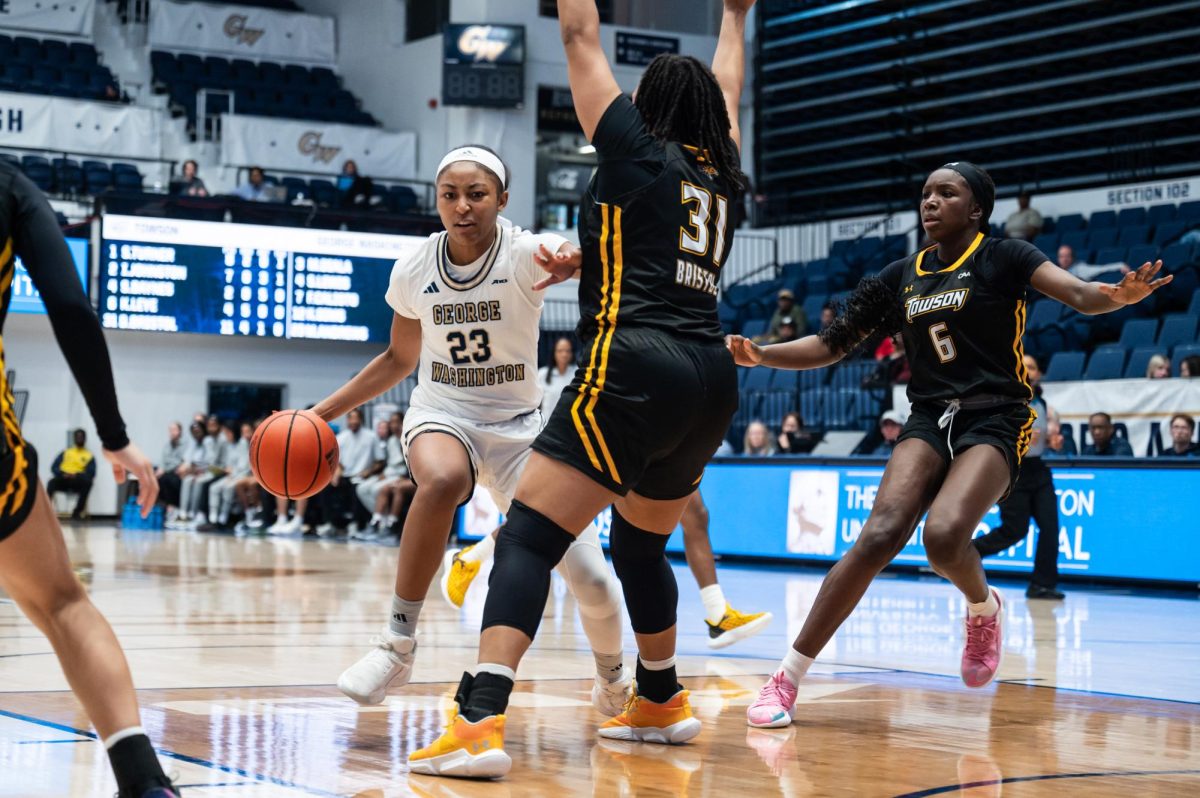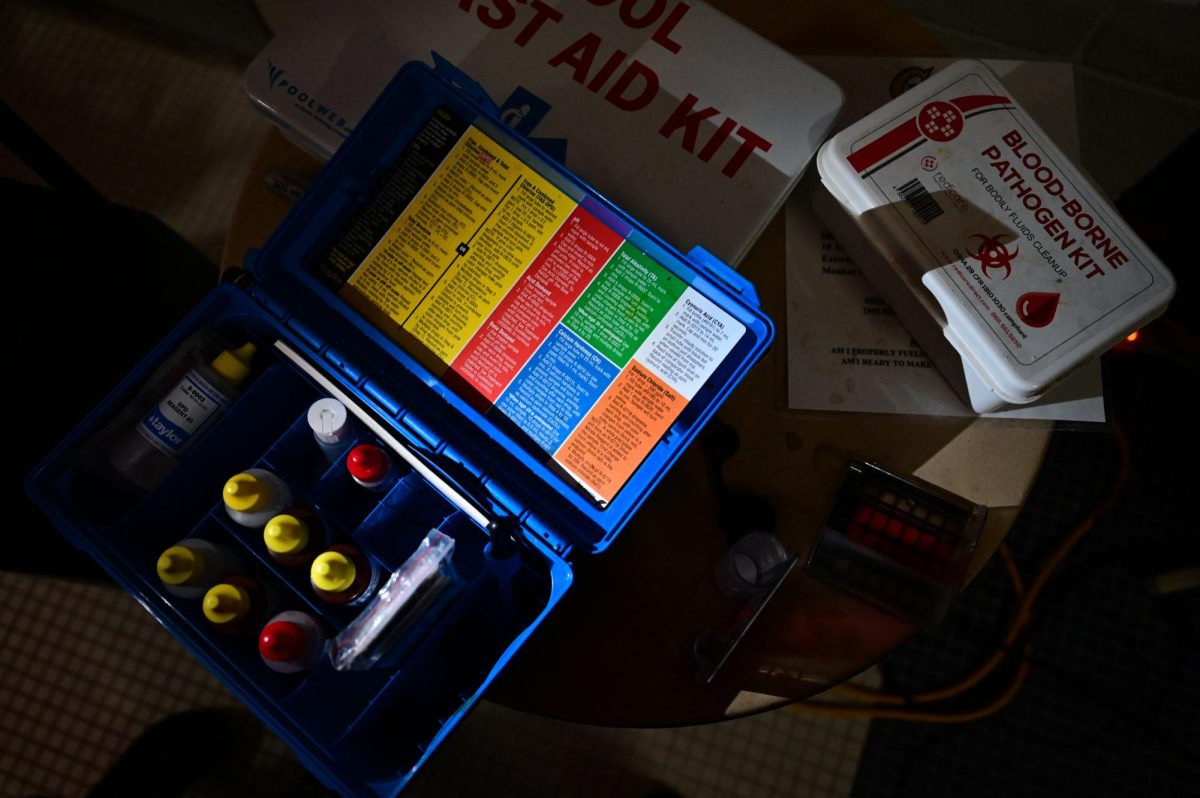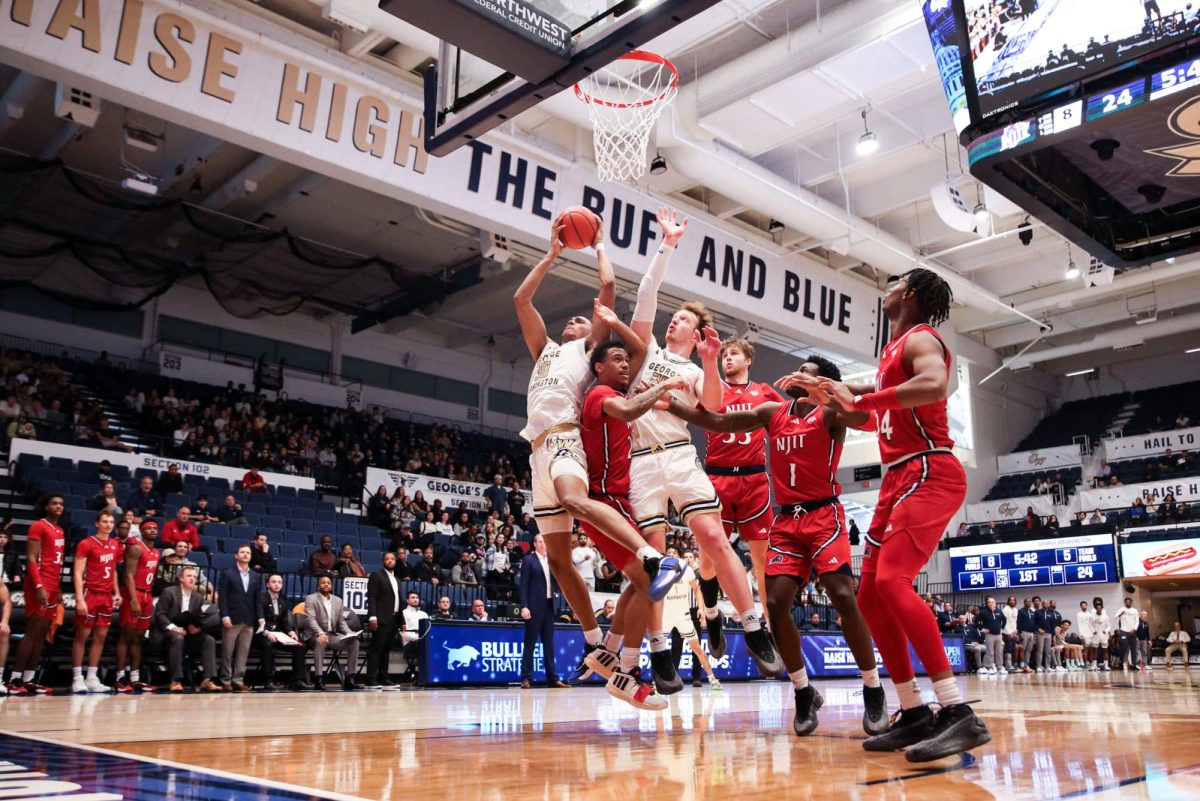As Tony Taylor crashed to the floor, he heard the whistle and knew it was over.
The senior guard let his head fall onto the ground, closing his eyes momentarily. With three minutes and 46 seconds left, the Colonials down by 12 to Loyola, he’d fouled out of the game.
It wasn’t a game where much went right for GW (4-4), and Taylor remained quiet after the final buzzer sounded. In a move characteristic of the guard, he again stepped forward to take responsibility after his team left the court with a disappointing 65-55 loss.

their third straight. Kopriva netted four points, grabbed three rebounds and added a block against Loyola.
“I don’t remember the last time I fouled out, but I think I’ve got to pick my spots a lot better,” Taylor said. “I just had a lot of unnecessary fouls and I hurt my team tremendously doing that.”
But the breakdowns extended across the roster during the Colonials’ third straight defeat, indicated by a recurring nemesis for GW this season: a crippling opponent scoring run.
The Greyhounds used a number of runs to topple the Colonials Wednesday night, including a 15-0 run to close play in the first and a 10-0 run to open play in the second.
“The breakdowns are really individual – we struggle to stop kids,” Lonergan said. “We did get some good shots in the second half, but we missed some easy shots, and you can’t do that if you’re down.”
Highlighting the damage of the scoring runs were the Colonials’ difficulties with ball control. GW was out-rebounded 21-9 in the first half, neglecting to box out and maintain a solid presence in the paint. Despite improving on the glass in the second, the Colonials still lost the rebounding battle 42-29, committing 15 turnovers, a sign of sloppy play, Lonergan said, missing opportunities his team can ill afford.
The lack of tight control contributed to GW’s shooting woes, going just 37.9 percent from the floor on the night. The Colonials stalled from beyond the arc, shooting just 30.8 percent from three-point range, a far cry from their success with threes earlier in the season.
GW couldn’t control the ball effectively through the halfcourt, frustrated by Loyola’s strong press defense that rushed the Colonials’ plays, overpowered by the Greyhounds doubleteams and aggressive nature.
“We’ve got some guys that pout a little bit about playing time or being taken out of the game and, you know, stats don’t lie. I’d like to see some guys really look in the mirror and really do some things that can help us be better as a team,” Lonergan said. “We don’t have a lot of toughness in certain people, where we’re willing to set screens and use screens. Like I said, you’re going to have to run some halfcourt offense if you’re not going to be a dominant rebounding team, which we’re not right now.”
Halfway through the first, after beginning the game with a more physical man-to-man approach than GW brought to the court in its last match, Lonergan switched to a zone defense, trying to apply more pressure in the paint after seeing Loyola struggle from the three-point line.
But his plan backfired, the Colonials returning to a man-to-man approach after the Greyhounds heated up from beyond the arc. Loyola finished the game shooting 54.5 percent from the perimeter, and 45.1-percent shooting from the floor. Lonergan was frustrated with his team’s defensive performance, pointing to GW allowing the Greyhounds open looks, and failing to shut down Loyola’s potent scorers. Many times, the Colonials left the middle wide open, allowing the Greyhounds ample room to drive to the net.
“Hopefully we’re going to do a better job defensively as a team,” Lonergan said. “We are giving up way too many open threes to the other team. And truthfully, I think a lot of that is just defensive focus and effort.”
There was one bright spot on the night for the Colonials: the surprising emergence of junior forward David Pellom. He led all of GW with 19 points, grabbing six boards, adding an assist and two steals. It was a new career-high for Pellom, many of his points coming off fast breaks where he was the recipient of his teammates’ passes, slamming home a characteristically reverberating dunk.
“It energizes us, but losing, it doesn’t feel as good, a career high,” Pellom said. “As much as I did it to help the team out, come to the victory, now we’re just going to bounce back, come back and practice hard.”
Usually, Pellom’s dunks energize his teammates, and Wednesday night, the crowd rose to its feet each time he gripped the rim. But his successes didn’t translate over for his teammates: Junior Lasan Kromah was the next highest scorer for GW, adding 11, followed by senior forward Aaron Ware, who posted eight points off the bench. Taylor posted six points, matching that output with six assists and grabbing three steals.
The team’s problems are cyclical, Lonergan said: It’s difficult to correct shooting problems in the face of rebounding difficulties and turnovers. Heading into its toughest game of the season, facing No. 3 (ESPN/USA Today) Syracuse Saturday, Lonergan wants his team to refocus on their fundamental play, shake off the losing slide and bring a different approach to the court.
“I’m a bad loser, and it’s really going to take me a couple of days to get over this,” Lonergan said. “But we have to bounce back. We’re playing maybe the best team on our schedule, maybe the best team in the country on Saturday and win or lose, we’re going to try to learn from it.”






